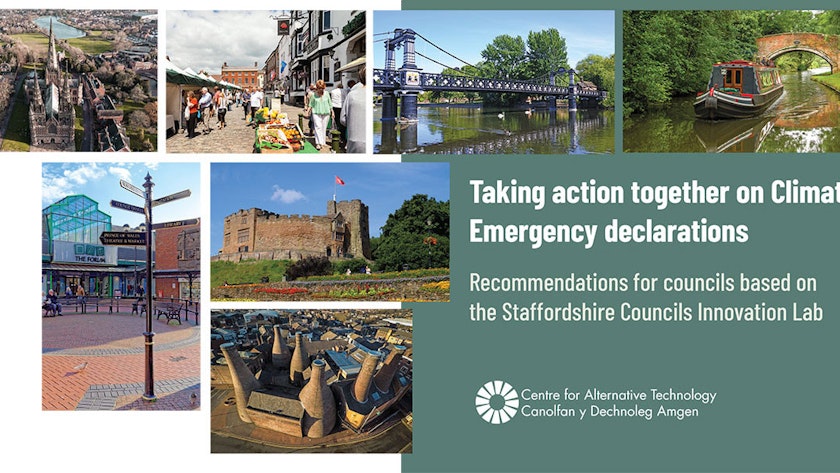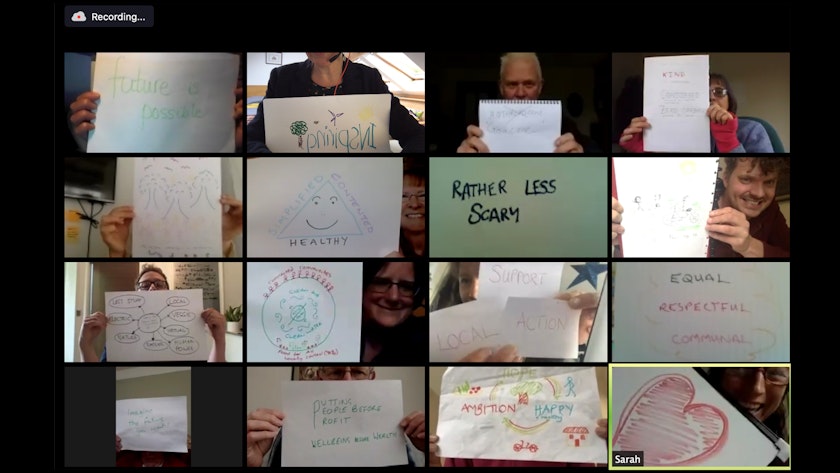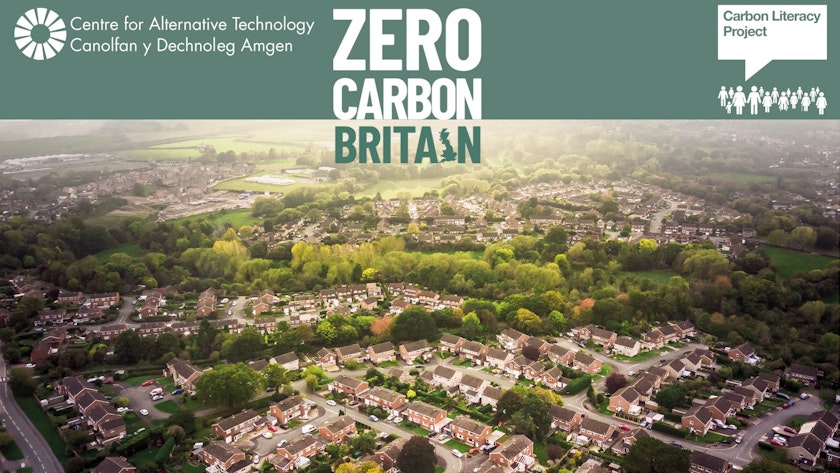Dr Anna Bullen and Amanda Smith look back on three years of designing and running CAT’s Zero Carbon Britain innovation labs and training courses that are empowering organisations to act on their climate emergency declarations.
Back in February 2020, we set ourselves the aim to improve the capacity of councils, communities and organisations to take action on the climate and ecological emergency, create systemic change, and increase resilience to climate change. So how would we do this?
The innovation lab model we have designed and delivered is co-creative, based on design-thinking, experimental, sense-making, and systemic. Through this and a series of training courses, we have guided a diverse range of people and organisations to develop solutions, break barriers and seize opportunities.
“The Zero Carbon Britain programme was the catalyst. It managed to bring [everyone] together and started that first conversation about how we might be able to work together to achieve a position of carbon neutrality.” – Innovation lab participant
The first labs
We began by mapping out who was already doing what and where, then identifying where the gaps were.
We decided that the best place to start was with councils, recognising the crucial role they have to play in the UK reaching net zero. While local authorities are only directly responsible for around 2-5% of their local area’s emissions, they are estimated to have power or influence over around one-third of local emissions, for example through planning policy, transport policy and partnership work.
We ran our first lab at a Climate Emergency UK event in November 2020. With around 100 people from councils across the UK, we explored the challenges they were facing in tackling the climate and biodiversity crisis and discussed what measures would help them in their journey to zero carbon.
Building on this experience, we went on to run the Staffordshire Councils Lab in partnership with Keele University, working with the 10 Staffordshire councils to co-design interventions that would address the barriers and enable them to work better together, at a county scale.
Out of this innovation lab grew the Staffordshire and Stoke on Trent Climate Commission, aimed at ‘accelerating action through collaborative cross-sector working to deliver an inclusive, just and economically secure transition to a net zero, climate resilient and nature-rich Staffordshire and Stokeon-Trent’.
Overcoming barriers together
We have since delivered another six innovation labs, working with businesses, charities, voluntary organisations, government bodies, community groups, academia, and the arts.
Together, we have explored a range of issues in detail and co-designed interventions. These issues have included: the role of land use; how best to engage businesses in the climate crisis; how the voluntary sector can best influence others; the arts sector’s role in addressing the climate crisis; how to embed climate justice in the journey to net zero; and individuals’ ability to act and influence those around them.
In recent months, we have run another lab with councils, this time commissioned by the Local Government Association (LGA) to co-design guidance that will embed sustainability in all council services.
We have engaged more than 300 people from service areas from libraries to transport. A series of workshops have covered themes including energy, waste, land use, forestry and agriculture, buildings, and transport. These have resulted in online guidance on each theme, available on the LGA website.

Training
Alongside the innovation labs, we have developed and run a series of training courses to enable organisations to overcome barriers to climate action. Each training event has been designed as part of an ongoing learning journey.
On the two-day Zero Carbon Britain course, participants have looked at the causes of the climate and biodiversity emergency and the tools we can use to reach zero carbon. External speakers have brought fresh perspectives and specialist knowledge for people to reflect on and apply in their work.
A one-day Local Energy Solutions course was designed with input from members of District Heating Divas, a network of women from across the UK’s heat network sector, to look at heat, energy and demand reduction. This training looked at local energy project case studies, stakeholder engagement, and legal considerations. We were later commissioned by Lancashire County Council’s NW Regional Energy Hub to run this course, first online and later in person.
We worked with the Carbon Literacy Project (CLP) to develop training accredited by them. Our first CLP course, Zero Carbon Britain: Carbon Literacy for Local Authorities, ran in September 2021. We went on to secure contracts from the Local Government Association to deliver CLP-accredited training on its behalf, developing programmes for elected members and senior officers. We created a ‘train the trainer’ session to make the training more impactful. We also worked with Poplar HARCA, a housing association, to develop bespoke training for them and added Carbon Literacy for the Housing Sector to our programme. Our most recent addition is Carbon Literacy for Communities.
“I think that the overall impact of the training is immense… If I hadn’t participated in the training, I would not be rolling out Carbon Literacy training within the council.” – Carbon Literacy training participant
Engagement in our training programmes resulted in requests for bespoke training and commissions. These have included two days of training for the Church of England and bespoke Carbon Literacy training for councils including Medway, Wrexham, the Royal Borough of Kensington and Chelsea, and others. A new Carbon Literacy ‘lite’ two-hour awareness training has just been developed for Public Health Wales.
Although the move to online training in 2020 presented a significant challenge, it actually enabled greater engagement, bringing participants from a wider geographical spread and from those who could not have travelled to CAT for various reasons. We were delighted to further widen access to our courses with the offer of more than 40 bursary places.
Real results
Three years since the start of the Hub and Lab, we have delivered eight innovation labs engaging nearly 1,000 people; trained nearly 6,000 people through 175 events; and worked with over half the local authorities in the UK. The potential impact of this support and shared knowledge is huge.
Those involved in the labs and training have consistently been positive about their experience, developing their understanding and skills, and, equally important, gaining the motivation and confidence to act on the climate crisis.
Ninety-two per cent of participants have said that at the end of the training they know what is needed to achieve net zero and why it is important that we do. They have also reported that they understand the role of individuals and organisations in developing a net zero strategy (compared with 38% at the beginning). Surveys after six months show that almost all participants report an increase in their confidence to take action.
“Just keep doing what you’re doing. I don’t think anyone could walk away from this training course without thinking seriously about the changes they can make both as an individual and by empowering others.” – Bespoke training participant

Thank you
We could not have achieved what we have over the last three years without a huge amount of support. Thank you to: the Moondance Foundation, for a generous donation that made the project possible; our staff and volunteers who have delivered the workshops and training, testing innovations along the way; a whole host of likeminded organisations that have shared their expertise and experience; and our valued members and supporters, without whom none of this would be possible.
If you would like to suppport CAT’s work, please consider becoming a member or making a donation today. Thank you.
About the authors
Anna is CAT’s Zero Carbon Britain Innovation Lab Manager. She is a qualified facilitator and project manager, with 25 years’ experience in the sustainability sector. She has a PhD in Sustainable Citizenship and is a firm believer in the use of co-creation to design effective and meaningful solutions to issues such as climate change.
Amanda is CAT’s Head of Learning – she has overseen the development of our Zero Carbon Britain training programmes, short courses and schools education work. She has over 20 years’ experience in teaching, school leadership, adult training and organisational improvement.
- Zero Carbon Britain
- Policy
- News Feed
Related Topics
EMAIL SIGN UP
Keep up to date with all the latest activities, events and online resources by signing up to our emails and following us on social media. And if you'd like to get involved and support our work, we'd love to welcome you as a CAT member.
